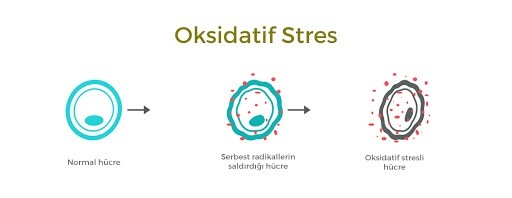Some waste and by-products produced by metabolic events in our body; It can affect the structural products, enzymes and gene products that provide cell and tissue integrity at the biochemical level.
The harmful substances that cause this condition, called oxidative damage (oxidative stress), are called reactive oxygen radicals or oxidants.
Free oxygen radicals are unstable on their own, they try to take electrons from our structures such as cells and DNA in order to become stable. The substances that protect the body by preventing the harmful effects of these substances are called antioxidants. These compounds neutralize free radicals, prevent the body from being affected by them and enable it to renew itself.

reactive oxygen radicals; refers to harmful substances that have an important effect on the development of a wide variety of health problems such as cancer, rheumatic diseases, infectious diseases, neurological diseases, diabetes, cardiovascular diseases.
Conditions that may cause an increase in free oxygen radicals;
- Tissue trauma due to inflammation and injury
- Mitochondrial overactivity
- Intense physical activity
- Ischemia
- Consumption of foods, especially refined, processed, trans fats and artificial sweeteners
- high blood sugar
- environmental pollution
- Smoking and alcohol consumption
- Infections
- Industrial solvents
- Exposure to radiation or ultraviolet rays
- Ozone
- Exposure to chemicals such as pesticides
- Intensive chemical treatments such as chemotherapy
While some of the antioxidants are produced in our body, some of them are taken from the outside with food. Since some vitamins cannot be produced in the human body and some minerals must be taken from outside on a regular basis, each individual should pay attention to a sufficient and balanced diet in terms of antioxidants.
Antioxidant ingredients:
- Glutathione
- Alpha lipoic acid
- vitamin A
- C vitamin
- Vitamin E
- Coenzyme Q 10
- Some minerals such as selenium, copper
- Various enzymes

